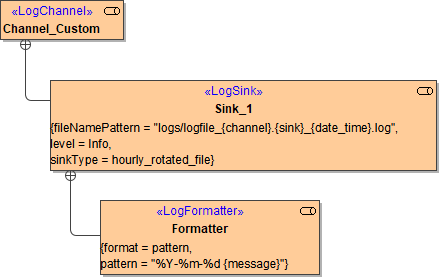Custom Logger Configuration:

Error Detail Object:
{
"element": "AF-1201",
"value": "Adapter"
}
Log Statement:
logTo("Channel_Custom", "Error",
"Stock_Synchronization/SYNC001: Item ID could not be found.", errorDetail);
Content of the Log File According to Defined Formatter (Class):
2020-06-25 Stock_Synchronization/SYNC001: Item ID could not be found. Detail: e2e:type='ErrorDetail', element='AF-1201', value='Adapter'
Content of the Log File (Array):
... Detail: e2e:type='ErrorDetail', [0].element='AF-1201', [0].value='Adapter', [1].element='CD-2000', [1].value='Connector'